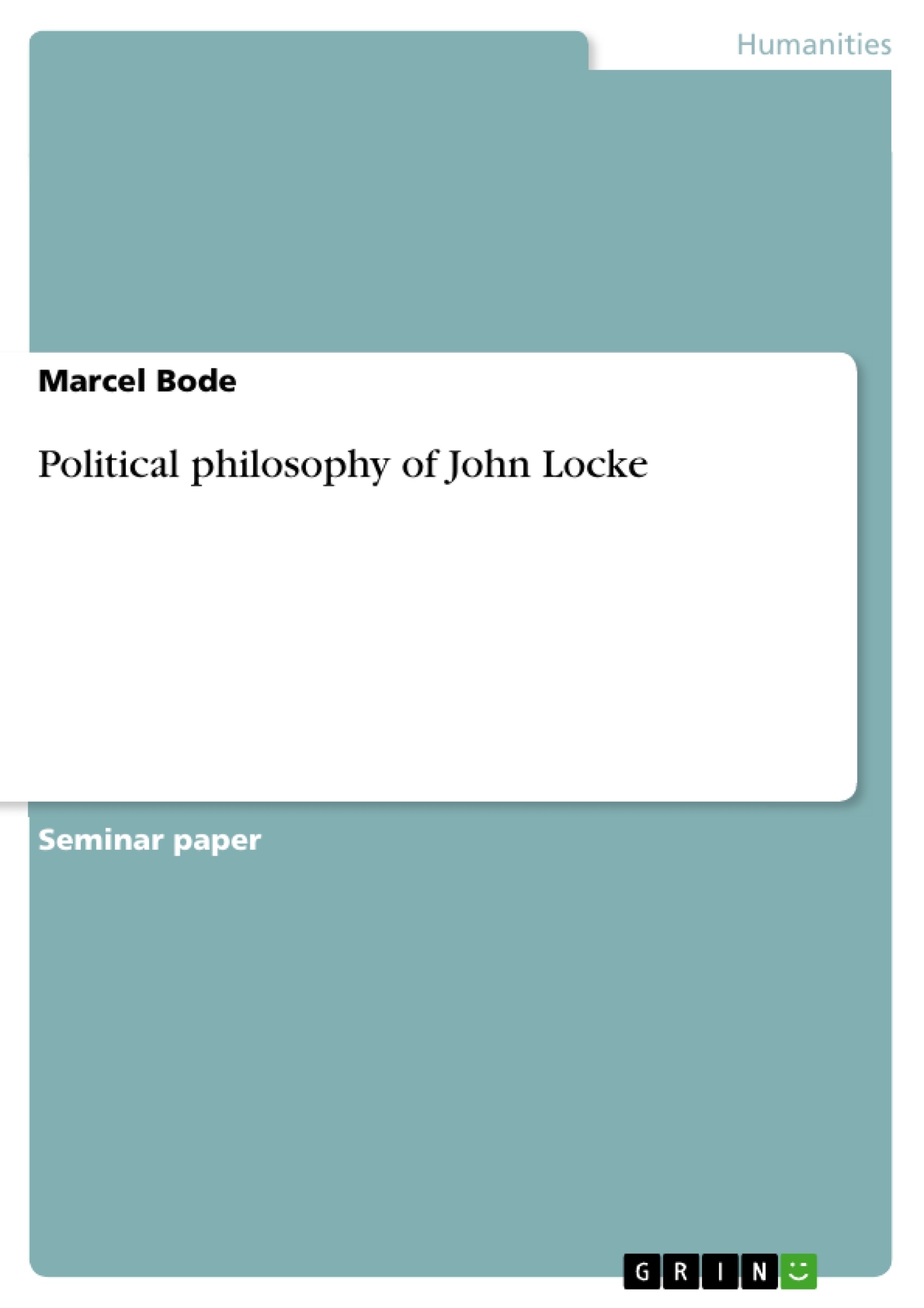Today in most western countries the political structure is characterized by a democratic system and the separation of powers. Moreover individual liberty and property rights are for most western states self-evident qualities. But to achieve these political modern comforts it took a long time of development. In this connection one of the key pathfinders and masterminds for democratic system was John Locke. John Locke’s philosophical works can be seen as a part of the Enlightenment.More and more thinkers examined the nature of existence, the way of thinking, the justification of religion and political power. There were different streams in arguing and different point of views. In this connection John Locke is considered one of the founders of the British Empiricists and also a very important representative and developer of the Social Contract Theory. His ideas had huge influence on the development of epistemology and political philosophy, and he is widely regarded as one of the most influential Enlightenment thinkers and contributors to liberal theory. His writings influenced many Enlightenment philosophers, as well as the American revolutionaries. The objective of this paper is to highlight the basic ideas of John Locke’s political philosophy. To classify his philosophy and the way it was influenced, it is necessary to give a short overview over the historic conditions and brief biography of Locke’s life. This is done in the second chapter. Based on this, the third chapter is dealing with Locke’s political philosophy itself. In this connection, especially the reasons for forming a political society and the extent and share of political power are in the centre of this examination. In the last chapter the influence of Locke’s political philosophy on subsequent history and current political systems is pointed out.
Table of Contents
- INTRODUCTION
- HISTORICAL CONDITIONS AND BIOGRAPHY
- Historical Conditions
- Biography
- POLITICAL PHILOSOPHY
- Political Power and the State of Nature
- The Law of Nature
- Violation of the Law of Nature
- Inconveniences of the State of Nature
- Social Contract
- The Extent of Government Power
- Separation of Powers
- Legislative
- Executive and Federative
- The End of Government
- IMPORTANCE OF LOCKE'S POLITICAL PHILOSOPHY
- BIBLIOGRAPHY
- INTERNET SOURCES
Objectives and Key Themes
This paper aims to shed light on the core tenets of John Locke's political philosophy. To contextualize his ideas and understand their influence, the paper will provide a concise overview of Locke's life and the historical conditions that shaped his thinking. Building upon this foundation, the paper will delve into Locke's political philosophy itself, focusing on the rationale behind the formation of political societies, the scope and distribution of political power. Finally, the paper will examine the enduring influence of Locke's political philosophy on subsequent historical developments and contemporary political systems.
- The influence of the Enlightenment on Locke's political philosophy
- The concept of natural law and its implications for political power
- The formation of a social contract and its role in establishing political authority
- The balance of power and the separation of government powers
- The enduring relevance of Locke's political philosophy in contemporary political systems
Chapter Summaries
- The first chapter introduces the paper's objectives and provides an overview of John Locke's significance as a pioneer of democratic thought. It places his ideas within the broader context of the Enlightenment, emphasizing the shift from medieval mysticism towards reason and the scientific approach to political and social issues.
- The second chapter provides a brief overview of the historical conditions and biographical details that shaped John Locke's political philosophy. It highlights the political and religious conflicts that characterized 17th century England, including the English Civil War, the rise and fall of the Commonwealth, and the Glorious Revolution. The chapter also examines Locke's personal life, his education, his role as a physician, and his close association with prominent figures of the Whig Party.
- The third chapter delves into John Locke's political philosophy, exploring his ideas regarding the state of nature, natural law, and the social contract. It examines the reasons for the formation of a political society and the relationship between individual liberty, property rights, and government power. The chapter also explores Locke's theory of the separation of powers, highlighting the importance of checks and balances in a limited government.
Keywords
The paper explores key concepts such as the Enlightenment, natural law, social contract, limited government, separation of powers, individual liberty, property rights, and democratic principles. These themes are central to understanding John Locke's political philosophy and its enduring legacy in modern Western political systems.
Frequently Asked Questions
What are the core ideas of John Locke's political philosophy?
Locke's philosophy is centered on natural law, individual liberty, and property rights. He argued that government authority is derived from the consent of the governed and should be limited by a social contract.
What is Locke's concept of the "State of Nature"?
Locke described the state of nature as a condition where individuals are free and equal, governed by the law of nature. However, due to "inconveniences" like the lack of an impartial judge, people choose to form a political society.
Why did Locke advocate for the separation of powers?
He believed that dividing government into legislative, executive, and federative powers would provide a system of checks and balances, preventing any single entity from becoming tyrannical.
How did Locke influence modern democratic systems?
Locke is considered a mastermind of liberal theory. His ideas influenced the American revolutionaries and the development of western democratic structures, particularly regarding human rights and limited government power.
What is the "Social Contract" in Locke's view?
The social contract is an agreement where individuals give up some of their freedom to a central authority in exchange for the protection of their natural rights, especially the right to property.
- Citation du texte
- Marcel Bode (Auteur), 2007, Political philosophy of John Locke, Munich, GRIN Verlag, https://www.grin.com/document/86493



